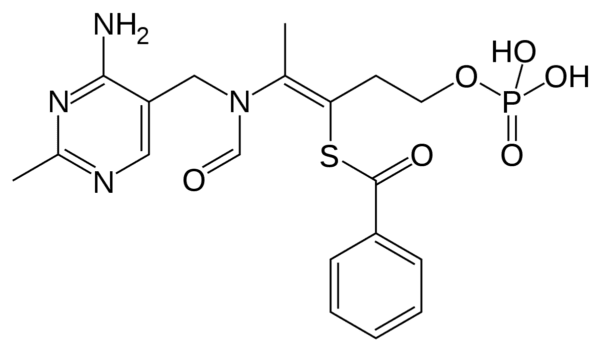In the world of dietary supplements, Benfotiamine has recently gained considerable attention due to its potential health benefits. A fat-soluble derivative of thiamine (vitamin B1), Benfotiamine is known for its superior bioavailability compared to regular thiamine, making it a popular choice for those seeking to manage blood sugar levels, promote nerve health, and improve overall well-being. In this comprehensive guide, we’ll explore what Benfotiamine is, its benefits, food sources, potential side effects, and where to buy it in bulk.
What is Benfotiamine?
Benfotiamine is a synthetic compound derived from thiamine, also known as vitamin B1. Unlike thiamine, which is water-soluble, Benfotiamine is fat-soluble. This unique characteristic allows it to be better absorbed by the body and remain active in tissues for longer periods. It was first developed in Japan in the 1950s and has been used as a supplement to support a variety of health issues, particularly those related to diabetes, nerve function, and oxidative stress.

The primary advantage of Benfotiamine over traditional thiamine is its enhanced bioavailability, which enables it to cross cell membranes more easily and enter the bloodstream in larger amounts. This is why Benfotiamine is often preferred in medical and wellness circles for addressing conditions like diabetic neuropathy and managing blood glucose levels.
Benfotiamine Food Sources
While Benfotiamine itself is typically consumed in supplement form, it is essential to understand the role of thiamine in the body, as it serves as the precursor to Benfotiamine. Thiamine can be found in a variety of foods, including:
- Whole grains (brown rice, oats, barley)
- Legumes (beans, lentils, chickpeas)
- Meat (especially pork, which is particularly rich in thiamine)
- Nuts and seeds (sunflower seeds, macadamia nuts, flaxseeds)
- Fortified cereals
- Vegetables (such as spinach, peas, and asparagus)
Although thiamine-rich foods are vital for overall health, the fat-soluble nature of Benfotiamine makes it more effective for specific therapeutic purposes, especially when a higher dose is needed to address health concerns.
Benfotiamine Forms and Specifications
Benfotiamine is available in various forms, including capsules, tablets, and powder. The typical dosage ranges from 150 mg to 600 mg per serving, depending on the desired effect and the manufacturer’s recommendations. For most users, Benfotiamine supplements are taken once or twice a day.
The powdered form of Benfotiamine is particularly useful for researchers or manufacturers looking to incorporate the compound into multi-ingredient formulations. The bioavailability of Benfotiamine is what sets it apart from regular thiamine, which makes it an effective option for improving overall health.
Benfotiamine vs Thiamine
Although Benfotiamine E thiamine are chemically related, there are important distinctions between the two. Thiamine is water-soluble, meaning it is not easily stored in the body and must be replenished regularly through diet. On the other hand, Benfotiamine is fat-soluble, allowing it to be absorbed more efficiently and stored in tissues for longer durations.
The bioavailability of Benfotiamine is significantly higher than thiamine, meaning that a smaller dose can achieve greater effects. This is particularly important in addressing conditions like diabetic neuropathy, where traditional thiamine supplements may not provide the same benefits due to absorption limitations.
Allithiamine vs Benfotiamine
Both Allithiamine E Benfotiamine are derivatives of thiamine that offer enhanced bioavailability. Allithiamine, a naturally occurring compound found in garlic, is also fat-soluble, but it is less commonly used than Benfotiamine. While both substances have been shown to support nerve health, Benfotiamine has undergone more extensive research, particularly in relation to diabetic neuropathy E blood glucose regulation.
Benfotiamine E Methyl B12
Methyl B12 (methylcobalamin) is a bioavailable form of vitamin B12, a crucial nutrient for nerve health, energy production, and cognitive function. When combined with Benfotiamine, Methyl B12 may offer synergistic effects, especially for individuals dealing with peripheral neuropathy or diabetic neuropathy. Both nutrients work together to promote nerve regeneration, reduce inflammation, and improve overall nerve function.
Sulbutiamine vs Benfotiamine
Sulbutiamine is another derivative of thiamine, composed of two thiamine molecules linked together. Known for its ability to cross the blood-brain barrier, Sulbutiamine is often used for cognitive support and mood enhancement. However, it does not have the same therapeutic benefits for nerve repair as Benfotiamine. Benfotiamine, due to its fat-solubility, is particularly effective in addressing nerve damage related to diabetic neuropathy and other conditions.
How Does Benfotiamine Work?
Benfotiamine works by increasing the availability of thiamine in the body, which is vital for various physiological processes, including energy metabolism and nerve function. The compound helps activate enzymes involved in energy production, reduces oxidative stress, and promotes the health of nerve cells. By improving thiamine levels, Benfotiamine can reduce the accumulation of harmful substances in cells, such as advanced glycation end-products (AGEs), which are linked to nerve damage and diabetic complications.
Health Benefits of Benfotiamine
- It Helps Maintain Healthy Blood Glucose Levels: Research has shown that Benfotiamine may help stabilize blood sugar levels by improving the body’s insulin sensitivity and reducing the negative effects of hyperglycemia.
- It May Help in Weight Loss: Some studies suggest that Benfotiamine may support weight management by enhancing the body’s metabolism, particularly in individuals with metabolic disorders like diabetes.
- It May Promote Nerve Repair: Benfotiamine is well-known for its ability to support nerve health. It has been shown to reduce nerve pain, improve circulation, and promote nerve regeneration in conditions such as diabetic neuropathy.
- It May Work Against Diabetic Neuropathy: As an adjunct treatment for diabetic neuropathy, Benfotiamine has demonstrated significant potential in alleviating symptoms like numbness, tingling, and burning sensations in the hands and feet.
- It May Work Against Depression: The potential neuroprotective effects of Benfotiamine may extend to mental health, with some research suggesting that it could help manage symptoms of depression by supporting proper nerve function and neurotransmitter balance.
Benfotiamine Side Effects
While Benfotiamine is generally well-tolerated, some individuals may experience mild side effects, including stomach upset, headache, or skin rashes. These side effects are rare and typically resolve once the body adjusts to the supplement. If you are pregnant, nursing, or have any underlying health conditions, it is always advisable to consult a healthcare provider before starting Benfotiamine.
Benfotiamine Dosage
The recommended dosage of Benfotiamine typically ranges from 150 mg to 600 mg per day, divided into one or two doses. For general health maintenance, a lower dose may suffice, while higher doses may be necessary for managing specific health conditions like diabetic neuropathy. As with any supplement, it’s important to follow the dosage instructions on the product label or as advised by a healthcare professional.
Where to Buy Bulk Benfotiamine Powder?
Bulk Bentofiamine may be purchased from our company, JL EXTRACT.
Our company is duly registered with the Food and Drug Administration and is certified by entities including Halal, Kosher, and GMP. Along with Benfotiamine, we offer many other dietary supplement ingredients which are of proven quality at very affordable prices.

